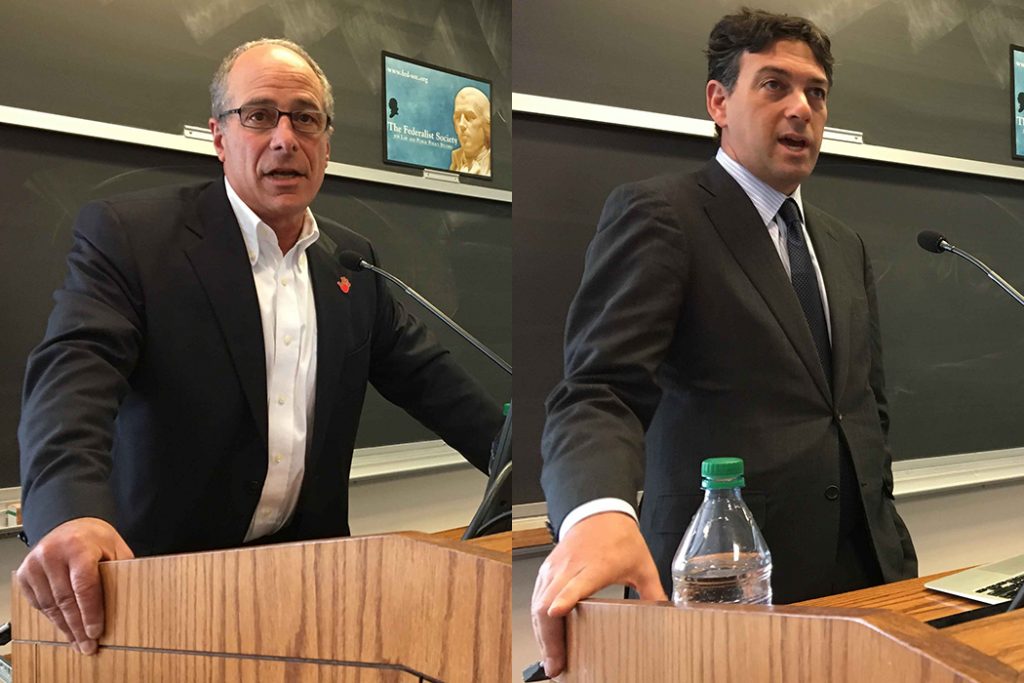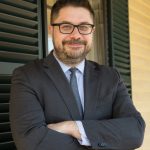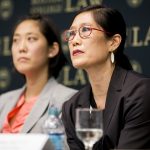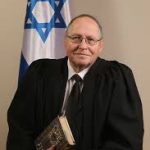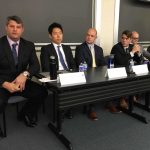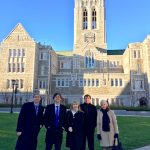The Second Amendment is a constitutional directive of nuance and complexity, and the topic was true to form on Nov. 3, when visiting experts John Rosenthal (above left) and Alan Gura (above right) came at the issue from two perspectives during a talk at BC Law School.
Gura approached it as a Supreme Court litigator who successfully argued for gun owners’ rights in District of Columbia v. Heller and McDonald v. Chicago. Rosenthal, founder and president of Stop Handgun Violence, presented a trove of statistics and made an activist’s case for stricter and common sense regulation.
Gura pursued a line of thinking that suggested more gray than black and white lines in the interpretation of the Second Amendment, parsing, for instance, its verbs “keep” and “bear” in response to moderator Rappaport Visiting Professor Carmen Ortiz’s question: “What does the right to bear arms in this country really mean?” Gura described how such words lead to a variety of questions, such as those surrounding access to guns and one’s purpose when carrying guns. The Supreme Court nevertheless exists to limit overreach of gun advocates when appropriate challenges are brought before it, he said.
Rosenthal’s approach was pragmatic. “There are more mass shootings now than there are days of the year,” he said. To reverse that and other gun violence trends, he suggested that one can start by studying Massachusetts’ gun laws, among the strictest in the nation, which have resulted since implementation in a 60 percent reduction in gun violence in the state, he said. By contrast, he noted, “a lot of the mass shootings are occurring in states with no gun restrictions.”
The speakers also discussed military-style weapons, the unregulated gun industry, the usefulness of background checks, the problem of mental illness, and the moral justification for guns. Neither implied that the Second Amendment is a problem for so-called “good” gun owners. And Gura said that part of the problem in the gun debate is cultural. “Lots of people don’t have guns and see no value in them, so restrictions seem reasonable to them,” he explained. “People are speaking past each other.”
For Rosenthal, the critical question remained: “What kind of country do we want to live in?”
The Rappaport Center for Law and Public Policy co-sponsored the event with the BC Law Democrats and the Federalist Society.
November has been one of the busiest months this semester at the Law School. Here are some event highlights.
Chris Bavitz, managing director of Harvard Law’s Cyberlaw Clinic and director of the Berkman Klein Center for Internet and Society, spoke on artificial intelligence, algorithms, and the law during a Nov. 3 lunchtime program hosted by BC Law’s Internet Law Society.
Vera Sung ’90 and Chanterelle Sung ’04 are sisters whose family’s bank was the subject of the award-winning PBS documentary Abacus: Small Enough to Jail. They participated in a Nov. 3 Rappaport Center panel on how Abacus, a community bank in New York’s City’s Chinatown, became the only bank to be sued during the banking crisis. Sharing the dias were moderator Professor Patricia McCoy; Sarah Walters ’97 of the firm McDermott, Will, and Emery; and Massachusetts Commissioner of Banks Terrence McGinnis.
Elyakim Rubinstein, 70, the legendary peacemaker—or as he referred to himself at his retirement from the Supreme Court of Israel, “a warrior for peace”—spoke on “The Supreme Court of Israel Within a Jewish and Democratic State” on Nov. 6. The Attorney General of Israel from 1997 to 2004, he is also a former Israeli ambassador who has had an influential role in that country’s internal and external affairs, most notably in helping to shape its peace treaties with Egypt and Jordan. The event was co-sponsored by the Consulate General of Israel in Boston, BC Clough Center for the Study of Constitutional Democracy, and Office of International Programs.
Six BC Law student veterans shared their military stories at BC Law’s Veterans Day presentation on Nov. 8. The speakers were Matthew Lane (US Marine Corps), George Mead and Matthew Smith (US Army), Brendan McKinnon (US Coast Guard), Cliff Sovich (US Navy), and Naes Park (South Korean Army).
Five Chilean criminal court judges toured Boston last week and included a stop at BC Law Nov. 10 to meet with faculty and other members of the Law School community. The judges are the first delegation to visit the city since an agreement was reached last year between the Supreme Court of Chile and Massachusetts Supreme Judicial Court. Susan Simone Kang, director of BC Law’s Graduate Legal Education and International Programs, organized the campus event.


